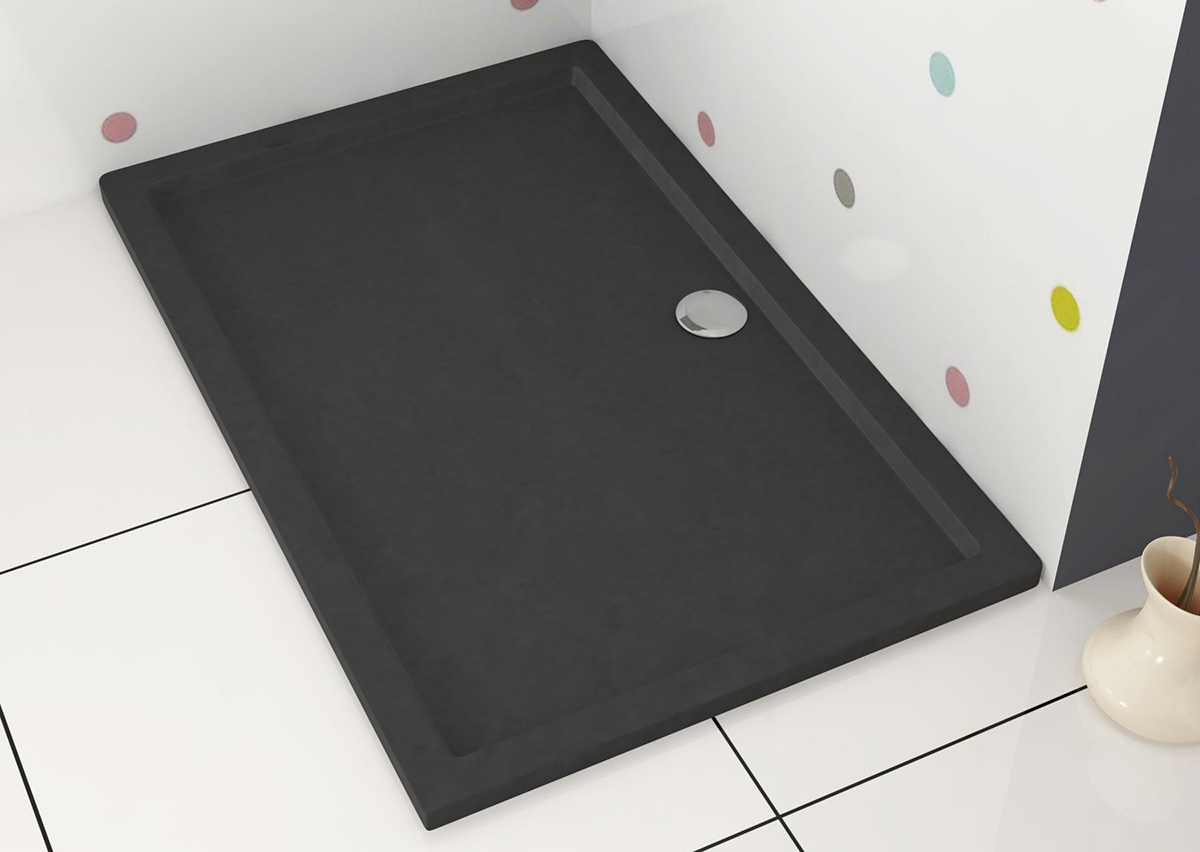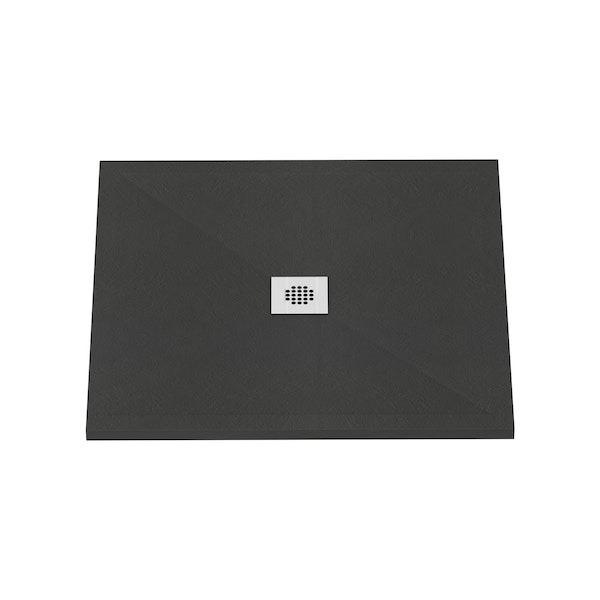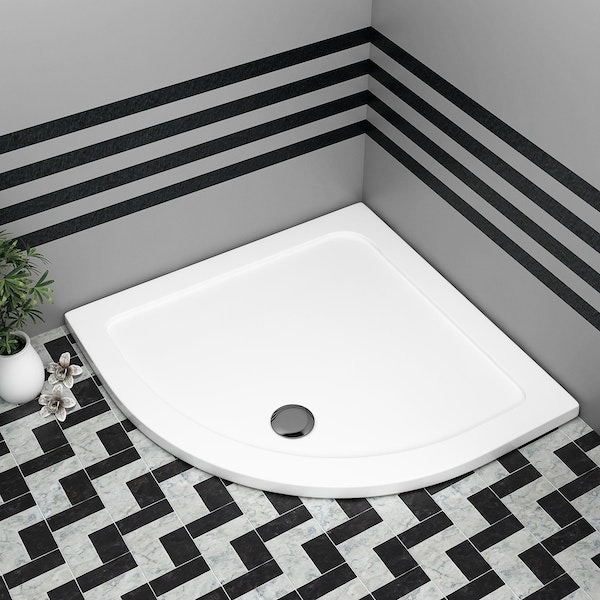
Ever wondered how the shower trays of your shower enclosure drain out all the water without ever flooding the floor? Or how those shiny white bases manage to keep the friction intact with feet preventing you from slipping? With the raised floor bed and sturdy structure, shower trays serve as the foundation for shower enclosures, keeping them firmly adhered to the bathroom.
Sadly, not all shower trays are the same. Some subpar variants are manufactured with non-porous materials that disintegrate and wash out with water as time passes. Besides making the floor susceptible to slipping, any leak in the shower bed – apart from the drainage hole – can lay alarming structural damage to the floorboards.
While there is an extensive variety of shower trays available in the market, it's generally recommended to prioritise the material construction over the style and shape of the tray when making a purchase.Unless you are going with a wet room that usually relies on a tiled shower base, finding the right shower tray material for your bathroom can be demanding. While there is an extensive variety of shower traysinstall a shower tray available in the market, it's generally recommended to prioritise the material construction over the style and shape of the tray when making a purchase.
What Are Shower Trays Made Of?
Besides the tiled shower bases that are normally used in walk-in shower enclosures and wet rooms, shower trays are mainly manufactured in four different materials.
1. Stone Resin Shower Trays
Sometimes referred to as molded stone bases, stone resin shower trays impart a stylish and comprehensive design statement to the room. These shower trays are primarily built from natural stone resins and synthetic plastic compounds, bringing a lustrous yet brawny appeal to the shower tray.


Out of all shower tray varieties, stone resin variants possess a solid structure and long-lasting ability. However, despite the hardened stone resin, they don’t weigh as much as their ceramic counterparts.
The molded stone shower bases are resistant to mold and mildew formation, making them easier to clean. What makes them safer is their waterproof finish that also safeguards against slipping. They offer a versatile range of styles and finishes, allowing you to find one that matches your bathroom’s unique outlook.
2. Acrylic Shower Trays
The term ‘acrylic’ is synonymous with bathroom fixtures. From vanity countertops and wash basins to bathtubs and shower trays, acrylic is the most prevalent element in a typical modern-day bathroom. With their rigid structure, affordable price range, and lush appearance, acrylic shower trays are mid-sized bathrooms' most widely installed shower bases.
Being relatively lightweight than stone resin trays, some acrylic shower bases are reinforced with wood that imparts flexibility. Although flexibility helps bear heavier loads, there’s always a risk of breakage associated with that. If you want to read more about why acrylic is used for bathtubs, you can visit this URL.
Acrylic shower trays are budget-friendly, ranging from £100 to £300. Since they are categorised as midrange shower pans, acrylic shower trays are manufactured in standard sizes and shapes. So, you may need to consider other possibilities in case you are replicating a designer’s bathroom.
3. Ceramic Shower Trays
Ceramics are not new to bathrooms and are certainly not new to the shower tray family. Ceramic or fireclay trays exhibit a heavy-duty build that is extensively rigid and shiny. Since they are tough enough to bear the brunt, fireclay shower bases are mainly used in commercial projects such as office buildings and other institutions.
If you disregard their weight, ceramic shower trays present no hassle when installing. Moreover, the non-slip surface makes it safer to shower on for kids and senior adults. Nevertheless, be careful not to let anything fall on the shower pan; they can chip if they counter a strong impact.
4. Fiberglass Shower Trays
Why spend heavy amounts on shower trays when your en-suite bathroom hardly ever receives a high footfall? If you are on a tight budget, fiberglass shower trays are the solution you need. They are a cheaper alternative to acrylic trays; in fact, they might be the cheapest shower bed category on the list.
Be that as it may, the cheaper price tag brings with it a number of flaws. Like any other fiberglass fixture, these shower trays are brittle, making them vulnerable to hits and impacts. Cheaper fiberglass trays are layered with waterproof paint, which starts to wear as time passes, indicating a shorter lifetime. Since they aren’t as popular as other shower tray types, you may find it challenging to get a custom-fit shower tray according to your requirements.


Bottom Line
Solid stone resin shower trays are unbeatable when it comes to sturdiness, versatile application, and an extensive range of styles and options. But if you are on a tighter budget, ceramic and acrylic shower trays are the way to go. Rigid build structure, hassle-free installation, and protection against mildew, acrylic shower trays are equipped with everything you might need in a shower pan.
FAQs about Shower Trays
Is Shower Tray Necessary for Shower Enclosure?
A shower tray is not strictly necessary for a shower enclosure, but it does offer a number of advantages. For example, it provides a level surface on which to stand or sit, which can be helpful if the floor of the shower enclosure is uneven. Another benefit is that it helps to contain water within the shower enclosure, preventing it from leaking out onto the floor. Finally, it can add a touch of luxury to the shower experience. For these reasons, most people choose to install a shower tray when they are setting up a shower enclosure.
How Do I Choose a Shower Tray Material?
There are a few factors to consider when choosing a material for your shower tray. One is installation - some materials, like stone, can be difficult to install without professional help. Another is weight - if your bathroom is on the second story or higher, you'll need to make sure the shower tray material is light enough to avoid putting too much strain on the floor. Finally, consider durability and maintenance - some materials require more regular cleaning and sealing in order to stay in good condition. Ultimately, the best material for your shower tray depends on your specific needs and preferences.
What Is the Best Material for Shower Trays?
The choice of the best material for shower trays should be based on various factors. One is durability; shower trays are constantly exposed to water and soap, so they need to be able to withstand years of wear and tear. Another is heat resistance; many materials can become warped or discolored if exposed to too much heat. Finally, there is the ease of cleaning; some materials are more difficult to clean than others, and this can be a major consideration if you use hard water.


With all these factors in mind, many experts recommend acrylic as the best material for shower trays. Acrylic is durable and resistant to both heat and scratches, and it is also easy to keep clean. In addition, acrylic comes in a wide range of colors and styles, so you can find an option that fits your bathroom décor. Whether you’re looking for a basic white tray or something more stylish, acrylic is a great choice.
How Do They Make Non Slip Shower Trays?
Non slip shower trays are designed to provide a safe and slip-resistant surface in the shower. There are a variety of different methods that can be used to make anti-slip shower trays, but the most common is to add a textured material to the surface of the tray. This can be done either by using a textured coating or by adding an abrasive material to the tray. The textured material helps to increase the friction between the tray and the feet, reducing the risk of slipping. Another way to make anti-slip shower trays is to add raised bumps or ridges to the surface of the tray. These raised features help to provide traction and reduce the risk of slipping. In some cases, anti-slip shower trays may also be made from a material that is naturally slip-resistant, such as rubber or stone.
Are Shower Trays Better Than Tiles?
When it comes to choosing a material for your shower, you have many options. Two of the most popular are tile and shower trays. So, which is the better option? Tile has many benefits. It is easy to clean and maintain, and it is also very durable. However, tile can be expensive, and it can be difficult to install. Shower trays also have many benefits. It is cheaper than tile, and it is much easier to install. In addition, the shower tray is less likely to crack or chip over time. Ultimately, the best material for your shower depends on your budget and your personal preferences.
Click here to read how you can make your bathroom look better even without tiles.
